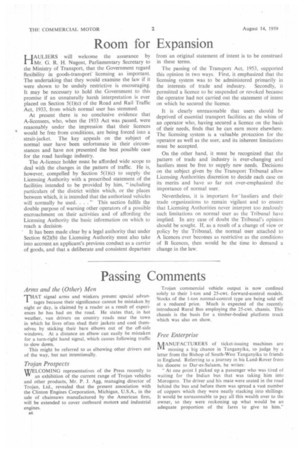Room for Expansion
Page 40

If you've noticed an error in this article please click here to report it so we can fix it.
HAULIERS will welcome the assurance by Mr. G. R. H. Nugent, Parliamentary Secretary to the Ministry of Transport, that the Government regard flexibility in goods-transporl licensing as important. The undertaking that they would examine the law if it were shown to be unduly restrictive is encouraging. It may be necessary to hold the Government to this promise if an unnaturally harsh interpretation is ever placed on Section 5(1)(c) of the Road and Rail Traffic Act, 1933, from which normal user has stemmed.
At present there is no conclusive evidence that A-licensees, who, when the 1933 Act was passed, were reasonably under the impression that their licences • would be free from conditions, are being forced into a strait-jacket. The key appeals on the subject of normal user have been unfortunate in their circumstances and have not presented the best possible case for the road haulage industry.
The A-licence holder must be afforded wide scope to deal with the changes in the pattern of traffic. He is, however, compelled by Section 5(1)(c) to supply the Licensing Authority with a prescribed statement of the facilities intended to be provided by him, "including particulars of the district within which, or the places between which, it is intended that the authorized vehicles will normally be used. . . " This section fulfils the double purpose of warning other operators of a possible encroachment on their activities and of affording the Licensing Authority the basic information on which to reach a decision.
' It has been made clear by a legal authority that under Section 6(2)(b) the Licensing Authority must also take into account an applicant's previous conduct as a carrier of goods, and that a deliberate and consistent departure from an original statement of intent is to be construed in these terms.
The passing of the Transport Act, 1953, supported this opinion in two ways. First, it emphasized that the licensing system was to be administered primarily in the interests of trade and industry. Secondly, it permitted a licence to be suspended or revoked because the operator had not carried out the statement of intent on which he secured the licence.
It is clearly unreasonable that users should be deprived of essential transport facilities at the whim of an operator who, having secured a licence on the basis of their needs, finds that he can earn more elsewhere. The licensing system is a valuable protection for the operator as well as the user, and its inherent limitations must be accepted.
On the other hand, it must be recognized that the pattern of trade and industry is ever-changing and hauliers must be free to supply new needs. Decisions on the subject given by the Transport Tribunal allow Licensing Authorities discretion to decide each case on its merits and have so far not over-emphasized the importance of normal user.
Nevertheless, it is important for• hauliers and their trade organizations to remain vigilant and to ensure that Licensing Authorities never interpret too zealously such limitations on normal user as the Tribunal have implied. In any case of doubt the Tribunal's opinion should be sought. If, as a result of a change of view or policy by the Tribunal, the normal user attached to A licences ever becomes as restrictive as the conditions of B licences, then would be the time to demand a change in the law.




















































































































